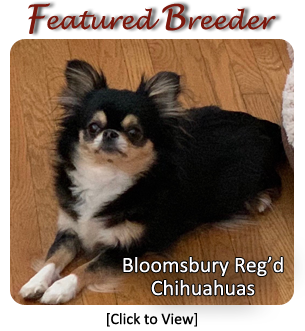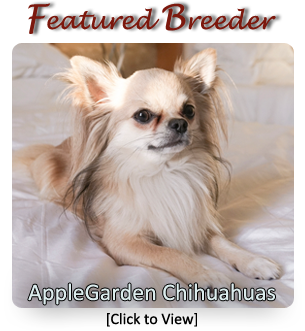
Chihuahua
Group: Toy Group
Origin: Mexico
Weight: Should not exceed 6 lb (2.7 kg).
Varieties: The Chihuahua may be either Smoothcoat (short) or Longcoat.
Lifespan: The Chihuahua’s lifespan is quite long, often 16 years or more.
CLICK HERE to View Breeder Listings
Breed Profile
Chihuahuas are the smallest breed of dog in the world. They are in fact the only “natural” Toy breed. That is, they are naturally small and aren’t a result of “breeding-down” larger breeds, as are other Toy breeds.
The Chihuahua may be either Smoothcoat (short) or Longcoat variety. It is believed that the Longcoat version of the Chihuahua was achieved by crossing the Shortcoat with other Toy breeds, such as the Papillon, the Pekingese, the Yorkshire Terrier and the Pomeranian.
In general, the Chihuahua is graceful, energetic, quick-moving, and sometimes described as having “Terrier-like” qualities, such as being alert and observant. He can be bold with other dogs much larger than himself and can also be very protective of his family. He is very loyal and wary of strangers which makes him a good watch dog.
The longcoat is soft and either flat or slightly curly. The ears should be fringed with feathering seen on the feet and legs. He also has a ruff on the neck and a plumed tail.
A Note about Teacup Chihuahuas:
A Chihuahua of the “Teacup”, “Toy”, “Pocket”, or any other name meaning “extra small” variety is not a known breed but rather the name given by some people for the smallest or runt of a litter. These tiny dogs tend to be more fragile and may have additional health issues over and above the larger dogs of a litter. All breeders may occasionally have an unusually small Chihuahua; however, a reputable breeder does not breed specifically for this trait.
A Bit of Breed History
The Chihuahua is thought to have originated from the state of Chihuahua in Mexico. There is much speculation about the breed’s history but, based on legend and artifacts found during archeological excavations, it is generally accepted that the Chihuahua existed in Mexico as early as the 9th century A.D. or earlier.
A common theory is that the Chihuahua descended from the Techichi which was a small dog that lived in central and northern Mexico. The Techichi was sturdier and more heavily boned than the Chihuahua of today which was selectively bred for a smaller size in the early 1900s.
A Few Quick Facts
- Lifespan: Chihuahuas have one of the longest lifespans for dogs and often live 16 years or more.
- Weight: Should not exceed 6 lbs. (2.7 kg) (per the CKC and AKC Breed Standards)
- There are two varieties of Chihuahuas: The Long and Smooth coat.
- Many Chihuahuas are born with a soft spot on the top of the head, known as the Molera. This is the same as that found in human babies. The presence of a molera does not mean the Chihuahua has a medical problem.
Health Issues
Like all breeds, some genetic/hereditary problems are found in the Chihuahua, including: Patellar Luxation, Eye problems, Hypoglycemia, heart disease, and tooth and gum ailments.
Many Chihuahuas, though not all, are also born with a soft spot on the top of the head, known as the Molera. This is the same as that found in human babies. The presence of a molera does not mean the Chihuahua has a medical problem. For additional information, see Molera Statement from the Chihuahua Club of America.
The Chihuahua is also known to shiver or tremble — this is not a health issue but rather a sign of stress or excitement.
If you are considering the adoption of a Chihuahua puppy, or any breed, it is very important to be selective in choosing a responsible and reputable breeder. Ensure that the prospective puppy’s parents have all health clearances. Breeding of any dog should not be done until after they have been proven to be free of evidence of significant hereditary diseases. Recommended testing for Chihuahuas include eyes, heart and patellas. (For more information on selecting a breeder, see the articles on the General Information page.)
Recommended Health Screening:
For the Chihuahua, the CHICNote 1 database includes health screenings for:
- Congenital Cardiac Database
- Eye Examination by a board Ophthalmologist
- Patellar Luxation
Additional Health Resources:
- Health and Nutrition — Growing section of the Canada’s Guide to Dogs website which includes information on several health and nutrition related issues.
- Canine Health Information Center (CHIC) — Providing a source of health information for owners, breeders, and scientists that will assist in breeding healthy dogs. CHIC is a centralized canine health database jointly sponsored by the AKC/Canine Health Foundation (AKC/CHF) and the Orthopedic Foundation for Animals (OFA).
- AKC Canine Health Foundation — Working towards developing scientific advances in canine health.
- OFA – Companion Animal Eye Registry (CAER)
- Orthopedic Foundation for Animals (OFA)
- Ontario Veterinary College (OVC)
- University of Pennsylvania Hip Improvement Program (PennHip)
- HealthGene — HealthGene Corporation is the leading provider of veterinary DNA diagnostic services in Canada.
- Labgenvet — Laboratory of Veterinary Genetics is a Canadian diagnostic laboratory that offers a comprehensive service of DNA tests for veterinary genetic diseases.
Breed Standards
- CKC Breed Standard
- AKC Breed Standard
- UKC Breed Standard
- The Kennel Club (U.K.) Breed Standard (Long Coat)
- The Kennel Club (U.K.) Breed Standard (Smooth Coat)
- FCI Breed Standard No. 218
- A Closer Look at the Chihuahua (From the British Chihuahua Club)

Grooming Information
- Grooming — This section of the Canada’s Guide to Dogs website includes tips, articles and information covering all aspects of dog grooming along with a listing of Groomers from across Canada.
Training Resources
While the Chihuahua once had a reputation of being yappy and somewhat aggressive, the overall temperament of the breed has improved significantly through the dedication and efforts of responsible breeders. In general, the Chihuahua has a good temperament and makes a great companion dog due to the strong bond that he forms with his owner. However, like all dogs, it is very important that the Chihuahua be socialized with other dogs, children, people and all types of situations from a young age. It is also important to discipline and train the Chihuahua as though he were any other larger dog. Too often, new Chihuahua owners tend not to correct their dog when he is jumping up, growling or barking. This can lead to a dog that believes he is the pack leader and one that will take full advantage of this role.
- Clicker Training Your Chihuahua
- Toy Breeds — Housebreaking
- Training — For training information, see this growing section of the Canada’s Guide to Dogs website for tips, articles, as well as listings of training centres across Canada.
Did You Know?
- The Chihuahua was first registered with the American Kennel Club in 1904 and with the Canadian Kennel Club in 1928.
- The Guinness World Record holder for the “Smallest dog living in terms of height” is a female Chihuahua named Miracle Milly from Puerto Rico. She measured 9.65 cm (3.8 in) tall.
- The smallest dog in terms of length, according to the Guinness World Record, is a female Chihuahua named Heaven Sent Brandy who measures 15.2 cm (6 in) from the nose to the tip of the tail. Brandy lives with her family in Florida.
Additional Information
- Chi-Hua-What? — A comprehensive Chihuahua FAQ to help you decide if a Chi might be the right dog for you and your family.
- 10 Things to Consider Before Getting a Dog
- Toy Breeds—Selecting the Perfect Pooch
- Clubs, Sports & Activities — For information on the many sports and activities you can get involved in with your dog.
- Working Dogs — The Working Dogs section of the Canada’s Guide to Dogs website provides information and listings of organizations that are involved in various dog jobs, such as Guide Dogs, Therapy Dogs, Police Dogs, Protection Dogs, and much more.
Famous Chihuahuas
Just a bit of information on a selection of Chihuahuas who have risen to fame for one reason or another — from heroic acts to movie star celebrity:
Bambi
A Chihuahua named Bambi, owned by Mr. and Mrs. Roland Morin, was credited with saving the life of a visiting friend by awakening her after a fire started in the house. The visitor who suffered from asthma, was resting at the time of the fire and believed she would have been asphyxiated had it not been for Bambi.
Momo
Japan’s newest police dog is a long-haired Chihuahua named Momo. She was one of 32 successful candidates out of 70 dogs, passing a search and rescue test by finding a person in five minutes after merely sniffing their cap. Momo will work in rescue operations in cases of distasters where her size may allow her to squeeze into areas where the larger rescue dogs may not fit.
Harley
Harley the Chihuahua was voted “American Hero Dog” for 2015 by the American Humane Association. Harley became a spokes-dog with an inspirational story of survival after spending his first ten years living in a small cage in a puppy mill. After finally being rescued by his current owners, Harley was in terrible shape with a rotting mouth, fused spine, gnarled toes, deformed legs, and he was missing an eye. 4 1/2 years later, Harley is all over social media as the spokes-dog for National Mill Dog Rescue. His campaign called “Harley to the Rescue” has raised enough money to save more than 500 puppy mill dogs in the last two years.
Chihuahua Celebrities
The Chihuahua is no stranger to Hollywood and has been featured in several movies and television shows. It all started with the $500 million Taco Bell advertisement campaign featuring a talking Chihuahua. Since then, Chihuahuas have starred in shows like “That’s so Raven”, “Ren & Stimpy”, “Courage the Cowardly Dog” to name a few. Chihuahuas have even had their own movies: “Beverley Hills Chihuahua -1 ,2 and 3” and starred in blockbuster movies like “Legally Blonde”.
*NOTE 1: CHIC – The Canine Health Information Center “is a database of consolidated health screening results from multiple sources. Co-sponsored by the Orthopedic Foundation for Animals (OFA) and the American Kennel Club (AKC) Canine Health Foundation, CHIC works with parent clubs to identify health screening protocols appropriate for individual breeds. Dogs tested in accordance with the parent club established requirements, that have their results registered and made available in the public domain are issued CHIC numbers.” To learn more, visit: www.caninehealthinfo.org
*NOTE 2: The Fédération Cynologique International (FCI) is the World Canine Organization, which includes 91 members and contract partners (one member per country) that each issue their own pedigrees and train their own judges. The FCI recognizes 344 breeds, with each being the “property” of a specific country. The “owner” countries write the standards of these breeds in co-operation with the Standards and Scientific Commissions of the FCI, and the translation and updating are carried out by the FCI. The FCI is not a breed registry nor does it issue pedigrees.
Breed Listing
Quick Links
Get In Touch
- Email: canadasguidetodogs@gmail.com
- Email: info@canadasguidetodogs.com
- Visit us on Facebook: www.facebook.com/CanadasGuideToDogs
— CanadasGuideToDogs.com is an Amazon Associate as well as a participant in various affiliate programs, as such fees are earned from qualifying purchases.


